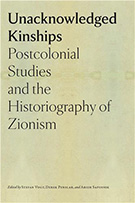Unacknowledged Kinships: Postcolonial Studes and the Historiography of Zionism

Stefan Vogt, Derek Penslar, and Arieh Saposnik, editors
Zionist thought, politics, and culture contextualized within colonial and postcolonial histories.
This book claims that there is an “unacknowledged kinship” between Zionism and post-colonial studies, a kinship that deserves to be discovered and acknowledged. It strives to facilitate a conversation between the historiography of Zionism and postcolonial studies by identifying and exploring possible linkages and affiliations between their subjects as well as the limits of such connections. The authors of the essays in this volume discuss central theoretical concepts developed within the field of postcolonial studies, use these concepts to analyze crucial aspects of the history of Zionism, and contextualize Zionist thought, politics, and culture within colonial and postcolonial histories. While the main purpose of the book is to test the applicability of postcolonial concepts to the history of Zionism, it also seeks vectors that move in the opposite direction.
Postcolonial studies might have something to gain from looking at the history of Zionism as an example of not only colonial domination but also the seemingly contradictory processes of national liberation and self-empowerment. Postcolonial studies and the historiography of Zionism could profit from each other if they could bridge the political chasm that all too often underpins their disciplines. This does not mean that these fields should look upon the other without critical scrutiny. To the contrary, an open and critical exchange could help each discipline address its own limitations and weaknesses which, in both cases, often derive from tendencies to essentialization and self-affirmation. The book is the first to systematically investigate the potential for a dialogue between postcolonial studies and the history of Zionism. It is also unique in suggesting that postcolonial concepts can be applied to the history of European Zionism just as comprehensively as to the history of Zionism in Palestine and Israel or in the Arab countries. Most importantly, the book is an overture for a dialogue between postcolonial studies and the historiography of Zionism.
"This volume brings together an unusually rich collection of theoretical interventions, historical case studies, and long-deferred conversations that interrogate the fraught relationship between Zionism and post-colonialism. The editors make a strong case for bringing into dialogue the two phenomena and the abundant scholarship they have generated. The result is a deeply engrossing, provocative, and often surprising reading experience that requires one to think anew about core assumptions." — David N. Myers, Distinguished Professor and Sady and Ludwig Kahn Chair in Jewish History, UCLA
"This is a major volume attempting to create a rapprochement between postcolonial studies and the study of Zionism. The volume does what it sets out to do. It is the first serious attempt to rethink this relationship in both theoretical and concrete ways and is an enormously valuable first step in a mutual reassessment of contemporary theoretical approaches to Zionism. Given our present discussions about Zionism and antisemitism, a book that is of growing importance each and every day!" — Sander Gilman, co-author of Cosmopolitanisms and the Jews.
"The history of the Jews and of Zionism have entertained a supremely ambivalent relationship with postcolonial studies. As Europeans' most distinct and enduring 'inner' other, Jews were paradigmatic victims of colonialist practices and ideologies. Yet Zionism itself has often been accused of mirroring European colonialism. This immensely useful book brings much needed order to understand the tangled and ambivalent relationships between post-colonialism and the nationalist history of the Jews. More crucially, it shows that postcolonialism is a needed conceptual framework to further our understanding of the history and sociology of the Jews. This illuminating collection of texts will have a lasting impact on Israel and Jewish Studies." — Eva Illouz, Directrice d'Etudes, EHESS, Paris, and author of The Emotional Life of Populism.
"Challenging the received wisdom that defines Zionism as a colonial enterprise, this volume breaks new ground in looking at its many if ultimately unsuccessful links with anti-colonial movements worldwide. It represents, in addition, a welcome effort to lend depth and complexity to the history of nationalism more generally." — Faisal Devji, Professor of Indian History, University of Oxford
Purchase from Brandeis University Press
About the Editors
Stefan Vogt is adjunct Professor for Jewish History and research coordinator at the Martin Buber Chair for Jewish Thought and Philosophy at Goethe University in Frankfurt am Main. His main research areas are German-Jewish history, the history of Zionism and the history of colonialism. His is the author of two monographs, Subalterne Positionierungen: Der deutsche Zionismus im Feld des Nationalismus in Deutschland, 1890-1933 (Wallstein, 2016) and Nationaler Sozialismus und Soziale Demokratie: Die sozialdemokratische Junge Rechte 1918-1945 (Dietz, 2006), and the editor of the volume Colonialism and the Jews in German History (Bloomsbury Academic, 2022).
Derek Penslar is the William Lee Frost Professor of Jewish History at Harvard University. Penslar’s books include The Origins of the State of Israel: A Documentary History (with Eran Kaplan, The University of Wisconsin Press, 2011), Jews and the Military: A History (Princeton University Press, 2013), and Theodor Herzl: The Charismatic Leader (Yale University Press, 2020). Penslar is President of the American Academy for Jewish Research, a Fellow of the Royal Society of Canada, and an Honorary Fellow of St. Anne’s College, Oxford.
Arieh Saposnik is Associate Professor at the Ben-Gurion Institute for the Study of Israel and Zionism at Ben-Gurion University in the Negev. A historian of Zionism and Jewish nationalism, Saposnik is interested in the construction of national cultures and identities in the modern world. He is the author of Becoming Hebrew: The Creation of a Jewish National Culture in Ottoman Palestine (Oxford University Press, 2008), and of Zionism’s Redemptions: Images of the Past and Visions of the Future in Jewish Nationalism (Cambridge University Press, 2021).